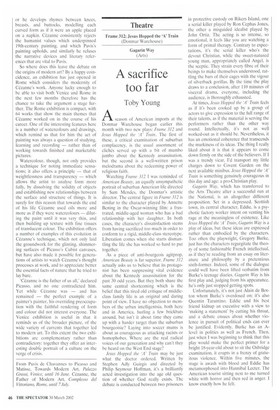Frame 312; Jesus Hopped the 'A' Train (Donmar Warehouse) Gagarin Way (Arts)
A sacrifice too far
Toby Young
Aseason of American imports at the Donmar Warehouse began earlier this month with two new plays: Frame 312 and Jesus Hopped the A' Train. The first of these, a critical examination of suburban complacency, is the usual assortment of clichés served up with a bit of mumbo jumbo about the Kennedy assassination, but the second is a well-written prison melodrama about the redeeming power of religious faith.
Watching Frame 312 I was reminded of American Beauty, an equally unsympathetic portrait of suburban American life directed by Sam Mendes, the Dontnar's artistic director. The central figure in Frame 312 is similar to the character played by Annette Bening in the Oscar-winning film: a frustrated, middle-aged woman who has a bad relationship with her daughter. In both cases, the character's dissatisfaction stems from having sacrificed too much in order to conform to a rigid, middle-class stereotype. Liberation comes when she starts dismantling the life she has worked so hard to put together.
As a piece of anti-bourgeois agitprop, American Beauty is far superior. Frame 312 actually asks us to believe that its protagonist has been suppressing vital evidence about the Kennedy assassination for the past 30 odd years. But they both share the same central shortcoming which is the belief that this tired old critique of middleclass family life is an original and daring point of view. I have no objection to members of the urban intelligentsia, both here and in America, hurling a few brickbats around, but isn't it about time they came up with a harder target than the suburban bourgeoisie? Laying into soccer mums is about as courageous as attacking racists or homophobes. Where are the real radical voices of our generation and why can't they be heard on the West End stage?
Jesus Hopped the A' Train may be just what the doctor ordered. Written by Stephen Adly Guirgis and directed by Philip Seymour Hoffman, it's a brilliantly acted investigation into the age old question of whether God really exists. The debate is conducted between two prisoners in protective custody on Rikers Island, one a serial killer played by Ron Cephas Jones, the other a misguided idealist played by John Ortiz. The acting is so intense, so emotional, it feels like you are watching a form of primal therapy. Contrary to expectations, it's the serial killer who's the devout Christian, while the sweet-natured young man, appropriately called Angel, is the sceptic. They strain every fibre of their beings to make themselves understood, rattling the bars of their cages with the vigour of siiverback gorillas. By the time the play draws to a conclusion, after 110 minutes of visceral drama, everyone, including the audience, is thoroughly exhausted.
At times, Jesus Hopped the A' Train feels as if it's been cooked up by a group of actors to give expression to the full range of their talents, as if the material is serving the performers rather than the other way round. Intellectually, it's not as well worked-out as it should be. Nevertheless, it has an emotional coherence that transcends the murkiness of its ideas. The thing I really liked about it is that it appears to come down firmly on the side of the believers. If I was a trendy vicar, I'd transport my little charges down to Covent Garden on the next available minibus. Jesus Hopped the A' Train is something genuinely courageous in this day and age: a pro-Christian play.
Gagarin Way, which has transferred to the Arts Theatre after a successful run at the National, is an altogether different proposition. Set in a depressed, Scottish town, its central character, Eddie, is a psychotic factory worker intent on venting his rage at the meaningless of existence. Like Jesus Hopped the A' Train, Gagarin Way is a play of ideas, but these ideas are expressed rather than embodied by the characters. Too often the playwright, Gregory Burke, just has the characters regurgitate the theory of some fashionable French intellectual, as if they're reading from an essay on literature and philosophy by a pretentious sixth-former. Indeed, some of the dialogue could well have been lifted verbatim from Burke's teenage diaries, Gagarin Way is his first play and, judging from his appearance, he's only just stopped getting spots.
Unfortunately, it's not just Alain de Botton whom Burke's overdosed on: it's also Quentin Tarantino. Eddie and his best friend kidnap an executive with a view to 'making a statementby cutting his throat, and a debate ensues about whether violence in pursuit of political ends can ever be justified. Evidently, Burke has an Alevel in politics as well as French. Then, just when I was beginning to think that this play would make the perfect primer for a bright 18-year-old about to sit the Oxbridge examination, it erupts in a frenzy of gratuitous violence. Within five minutes, the stage is awash with blood and Eddie has metamorphosed into Hannibal Lecter. The American tourist sitting next to me turned white with horror and then red in anger. I know exactly how he felt.


































































 Previous page
Previous page